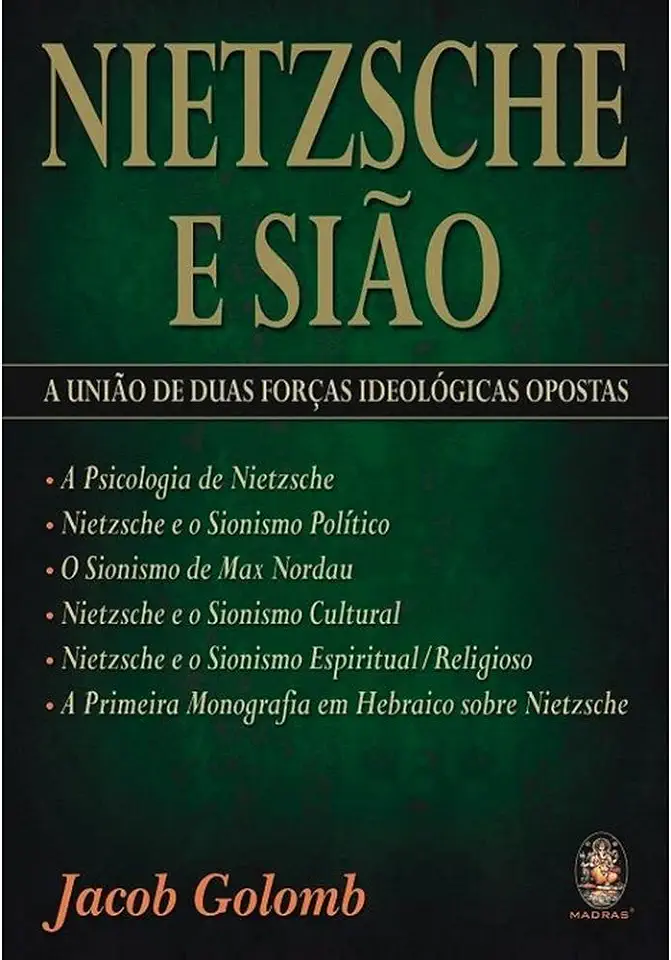
Nietzsche and Zion - Jacob Golomb
Nietzsche and Zion: A Study of Nietzsche's Relation to Judaism
Introduction
In his book "Nietzsche and Zion," Jacob Golomb presents a compelling and provocative study of the complex relationship between the renowned philosopher Friedrich Nietzsche and Judaism. Golomb argues that Nietzsche's philosophy, often misunderstood as anti-Semitic, is in fact deeply influenced by Jewish thought and tradition. Through a meticulous examination of Nietzsche's writings and personal life, Golomb reveals a profound engagement with Jewish ideas, figures, and history that sheds new light on the philosopher's work.
Nietzsche's Jewish Heritage
Golomb begins by exploring Nietzsche's personal connection to Judaism. He traces Nietzsche's ancestry back to Polish Jews who converted to Protestantism in the 18th century. Golomb argues that this Jewish heritage played a significant role in shaping Nietzsche's intellectual development, even though Nietzsche himself often denied or downplayed his Jewish roots.
Nietzsche's Engagement with Jewish Thought
Golomb then examines Nietzsche's extensive engagement with Jewish thought and literature. He shows how Nietzsche was deeply familiar with the Bible, the Talmud, and other Jewish texts, and how he drew inspiration from Jewish ideas and concepts in developing his own philosophical system. Golomb argues that Nietzsche's philosophy is in many ways a response to Jewish thought, and that it can be understood as a kind of "Jewish philosophy" in its own right.
Nietzsche's Critique of Christianity
One of the most striking aspects of Nietzsche's philosophy is his critique of Christianity. Golomb argues that Nietzsche's rejection of Christianity is rooted in his understanding of Christianity as a Jewish religion that has been corrupted and distorted by Gentile influences. Nietzsche saw Christianity as a slave morality that suppresses the natural instincts and desires of human beings, and he believed that it was necessary to overcome Christianity in order to create a new, more vital and authentic way of life.
Nietzsche's Vision of the Übermensch
Golomb also explores Nietzsche's concept of the Übermensch, or "superman." He argues that the Übermensch is not a racist or elitist ideal, but rather a symbol of human potential and self-overcoming. Nietzsche believed that the Übermensch is a new type of human being who is capable of transcending the limitations of conventional morality and creating a new, more meaningful existence.
Conclusion
In conclusion, Golomb argues that Nietzsche's philosophy is a complex and multifaceted response to Judaism. He shows how Nietzsche was deeply influenced by Jewish thought and tradition, and how he used this influence to develop his own unique and provocative philosophical system. Golomb's book is a major contribution to the study of Nietzsche and Judaism, and it offers a new perspective on one of the most important philosophers of the modern era.
Why You Should Read "Nietzsche and Zion"
"Nietzsche and Zion" is a must-read for anyone interested in Nietzsche's philosophy, Judaism, or the intersection of religion and philosophy. Golomb's book is a fascinating and thought-provoking exploration of a complex and often misunderstood relationship. It is a work of scholarship that is both rigorous and accessible, and it is sure to challenge and inspire readers of all backgrounds.
Here are a few reasons why you should read "Nietzsche and Zion":
- Golomb presents a new and provocative interpretation of Nietzsche's philosophy, arguing that it is deeply influenced by Jewish thought and tradition.
- The book is meticulously researched and well-documented, drawing on a wide range of sources to support Golomb's arguments.
- Golomb's writing is clear, engaging, and accessible, making the book a pleasure to read for both scholars and general readers alike.
- "Nietzsche and Zion" is a major contribution to the study of Nietzsche and Judaism, and it is sure to have a significant impact on the field.
If you are interested in learning more about Nietzsche, Judaism, or the intersection of religion and philosophy, then "Nietzsche and Zion" is a book that you cannot afford to miss.